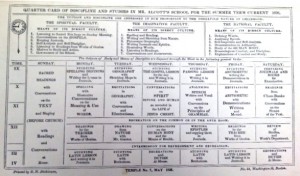Martha Anne (Kuhn) Clarke kept a diary in 1836, while a student at the Temple School in Boston. The series of excerpts began here and continued here. In this installment she writes of her journey through western Massachusetts and into New York.
Thursday August 11th, 1836
I rose and went out to see what I could find to play with. I found a little cosset and some pigs. We played with the little lamb till breakfast was ready. The lamb would follow the little girl wherever she went. After breakfast we played with the pigs till 8 oclock. We then started and rode five miles to the village of Springfield. We found some flowers and blackberries on the way. When we got there we stopped at a friends house. I played the morning. In the afternoon we took a ride with our friend to see the armory. I saw a room with 28,188 guns and in another 32,184. We then went to see them make guns. It took a great many men to make one gun. 250 men were employed in making them. We went next to the water works where they made some part of a gun. The most wonderful thing we saw there was a wheel which was used for polishing brass or steal. It turned round 1500 times a minute. We then came home and after tea played till bed time.
Friday August 12th, 1836
I rose and wrote my journal before breakfast. After it we went down on the shore of the Connecticut R[iver]. When we got back father and mother were waiting for us so we left Springfield which I think is a very pleasant place. We passed through Westfield, Russell. We had quite a pleasant ride through these places. Some of the way there was mountains, on the other a deep precipice. We dined at Chester. Whilst they were getting dinner Father took a walk with us down on the bed of the Western Branch. We went out into the middle of the river on the stones. Coming home we forded a small river. After dinner we went down to the river again and played. Father came after us when it was time to go. We went over the Posiac Turnpike by the river to Pittsfield. It was very hilly. I think the people are very industrious between these places because the very high hills had corn and grain. We saw an owl in the woods. It was 9 oclock when we got to Pittsfield. We had some supper and went to bed.
Saturday August 13th, 1836
In the morning we left Pittsfield and went to Lebanon Springs. The road leads over the Hancock Mountains to the springs. We played till dinner was ready. In the tree by our window there was a pretty little yellow bird sitting on a nest. Once in a while another bird (of the same kind) came and brought it something to eat and sung a little while after which it flew away. We had dinner after which we played a little then I wrote my journal. After tea we went to bed.
Sunday August 14th, 1836
After breakfast we prepared and went to the village. There were several carriages going. One went very fast. It tipped over, the wheel came off and a lady was hurt. When we got to the village the meeting house was open. The ladys sat on one side. They wore white gowns with tight sleeves, high heeled shoes, caps without ruffles, with their white hankerchiefs over their arms. The men sat on the other side. They had on very long waistcoats. Their meeting was quite long. After meeting we went to New Lebanon and dined. We continued our journey to the village of Sand Lake.
The series concludes here. The diary can be found in the Society's R. Stanton Avery Special Collections.
Share this:
About Andrew Krea
Andrew Krea holds a B.A. in English Literature from Brandeis University, in Waltham, Massachusetts, and a Master’s Degree in Library Science from Simmons College in Boston, Massachusetts. He has previously interned at the Massachusetts Historical Society. His areas of interest and expertise include New England research, specifically genealogies dating back to the inception of the Massachusetts Bay Colony, and researching and writing historical narratives of family genealogies.View all posts by Andrew Krea →
